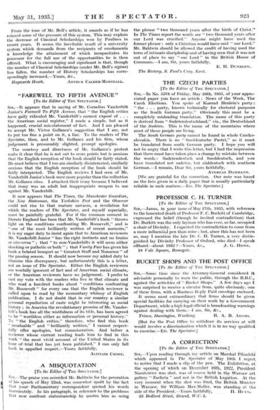"FAREWELL TO FIFTH AVENUE" [To the Editor of THE SPECTATOR.]
SIR,—It appears that in saying of Mr. Cornelius Vanderbilt Junior's Farewell To ...Fifth Avenue, that " the English critics have gaily ridiculed Mr. Vanderbilt's earnest expose of . . . the American social register," I made a simple, but as it happened, crucial mis-statement of fact. And I am phased to accept Mr. Victor Gollancz's suggestion that I am, not to put too fine a point on it, a liar. To the readers of The Spectator, then, and to Mr. Gollancz and his firm, whose judgement is presumably slighted, prompt apologies.
The courtesy and directness of Mr. Gollancz's protest
make it clear that he is not out to score points but is anxious that the English reception of the book should be fairly stated. He must believe that I too am similarly disinterested, similarly anxious that the English reception of the book should be fairly interpreted. The English reviews I had seen of Mr. Vanderbilt Junior's book were more popular than the collection Mr. Gollancz cites. I attacked their irony because I believed that irony was an adult but inappropriate weapon to use against Mr. Vanderbilt.
It now appears that The Times, the Manchester Guardian, the New Statesman, the Yorkshire Post and the Observer could not rise to that mature sarcasm, a revelation for which the readers of The Spectator, and myself especially, must be painfully grateful. For if the common consent in literate England has been that Mr. Vanderbill'a book " throws light on the conditions confronting Mr. Roosevelt," and is
one of the most brilliantly written of recent memoirs,"
it is my eager duty to insist again that to American reviewers Mr. Vanderbilt Junior "• has the right instincts and no brains' or vice-versa" ; that " to non-Vanderbilts it will seem either shocking or pathetic or both " ; that Vanity Fair has given his book a belated bouquet as " Greatest Stuff and Nonsense " of the passing season. It should now become my added duty to illumine this discrepancy, but unfortunately this ' is a letter, not an issue of The Spectator. Either the English -reviewers are woefully ignorant of fact and of American social climate,' or the American reviewers have no judgement. I prefer to cast my vote with the readers who live in that climate and who read a hundred books about " conditions confronting Mr. Roosevelt " for every one that the English reviewer is called upon to read by the momentary whimsy of 'English publication. I do not doubt that in our country a similar personal repudiation of caste might be interesting as social history ; in America the revolutionary promise of Mr. Vander- bilt's book has all the wistfulness of its title, has been agreed to be " worthless either as information or personal history." To " the English critics," therefore, who find this book " invaluable " and • " brilliantly written," I cannot respect- fully offer apologies, but commiseration. And before a, reviewer Whose current reading leads him to find in this work " the most vivid account of the United States in its hour of trial that has yet been published," I can only fall back in appalled respect;—Yours fhithfully,
ALISTAIR COOKE.


























































 Previous page
Previous page